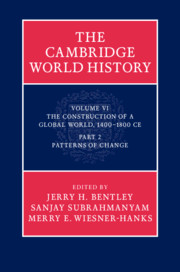Book contents
- The Cambridge World HistoryVOLUME VI
- The Cambridge World History
- The Cambridge World History
- Copyright page
- Dedication
- Contents
- Figures
- Maps
- Tables
- Contributors
- Preface
- Part One Migrations and Encounters
- Part Two Trade, Exchange, and Production
- Part Three Religion and Religious Change
- 13 The scholarly discovery of religion in early modern times
- 14 Christianity in Europe and overseas
- 15 Islam in the early modern world
- 16 Religious change in East Asia
- Part Four Questions of Method
- Index
- References
15 - Islam in the early modern world
from Part Three - Religion and Religious Change
Published online by Cambridge University Press: 05 May 2015
- The Cambridge World HistoryVOLUME VI
- The Cambridge World History
- The Cambridge World History
- Copyright page
- Dedication
- Contents
- Figures
- Maps
- Tables
- Contributors
- Preface
- Part One Migrations and Encounters
- Part Two Trade, Exchange, and Production
- Part Three Religion and Religious Change
- 13 The scholarly discovery of religion in early modern times
- 14 Christianity in Europe and overseas
- 15 Islam in the early modern world
- 16 Religious change in East Asia
- Part Four Questions of Method
- Index
- References
Summary
Keywords
- Type
- Chapter
- Information
- The Cambridge World History , pp. 358 - 386Publisher: Cambridge University PressPrint publication year: 2015

